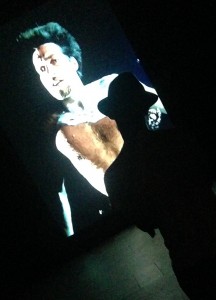By Peter Maddern
Many recognise in the work of sometimes controversial Australian photographer Bill Henson the exploration between twilight zones, nature and civilization, youth and adulthood, male and female. Bill Viola, the internationally acclaimed video artist, takes this investigation of transitions some stages further through looking more at whole of life passages and the intense interactions of humans and the elements (a freedom afforded him, of course, relative to Henson, by his media of choice.)
Spread across three venues (and still on at the AGSA), this review of Viola’s works for the Adelaide Festival encompasses seven installations, all of which with sufficient patient viewing will entrance and enthral.
For this reviewer the two most memorable were those at the Queen’s Theatre. Fire Woman presents a woman, perhaps a monk, silhouetted in front of a massive inferno before turning and approaching the camera she plunges into a dark pool, after which the whole converges and then breaks down into its constituent elements of colour before fading to black. Tristan’s Ascension then confounds further where a dead knight in white robes lies on a slab and becomes caught up in a waterfall that does not descend upon him but rather ascend, as he eventually does with it as well. The spectacular imagery is enhanced by the sound where, whether it is water or fire, the elements roar at the viewer and resonate in the space provided. As much fascination arises from the how as the what of the works and certainly any attempt at recreating these works falls clearly into the ‘don’t try this at home’ category.
Life’s entire passage is seen in Three Women at the Cathedral and The Encounter and Walking on the Edge at the Art Gallery. In the first of these, three women, a mother and two daughters, emerge out of a pixelated, blurred abyss and enter the world of the living defined by colour and high definition, before each, again led by the mother, retreats to the nether world, each in turn occasionally turning back to view the possibilities they are forsaking. In The Encounter, two men, a father and son, converge at the end of a long walk before exchanging places and moving away from each other again to the extremities of the screen.
In addition to the compelling impact of the visual and aural elements of the works, all mostly delivered at super slow motion, Viola has also managed some excellent performances from his various actors. Most memorably is Chad Walker in The Messenger, the last of the works in the Art Gallery, which as a piece around the passage between life and death via a watery veil is a forerunner by nearly a decade to Three Women. Here, Walker, nude and parallel to the camera, appears ever so slowly out of the murky depths of a pond and announces his arrival at the surface with a massive exhale of air that accompanies a look of innocence and surprise. Perhaps this is birth but soon he starts to sink back and is again lost to us other than for a few bubbles that keep floating to the surface. This cycle then goes on for the best part of half an hour and even in super slow-mo the control of the actor is as much a feature as the sound and ethereal blue light that shines down from the top right corner of the portrait-oriented screen.
Certainly across all the works, we get the message about the flimsy nature of life, the pointlessness of what may obsess us during it and its overall insignificance in terms of the course of the earth. Yet, for all that down beat stuff, Viola seems to still convey a sense of the triumphant and magnificent about life itself.
Those slow off the mark will lament the short seasons of these works other than at the Art Gallery (which ends this Sunday) and the dispersal of them around the city only serves to highlight the issue we have in this town about the lack of a dedicated contemporary art space (and good luck looking to this Government for inspiration on this issue.) Still, given the Blinc blunder, at least what promised to be a mighty visual arts program at this year’s Festival has been held up, albeit like the nature of some of the works, somewhat fleetingly by these wonders.
Kryztoff Rating 4K



Recent Comments